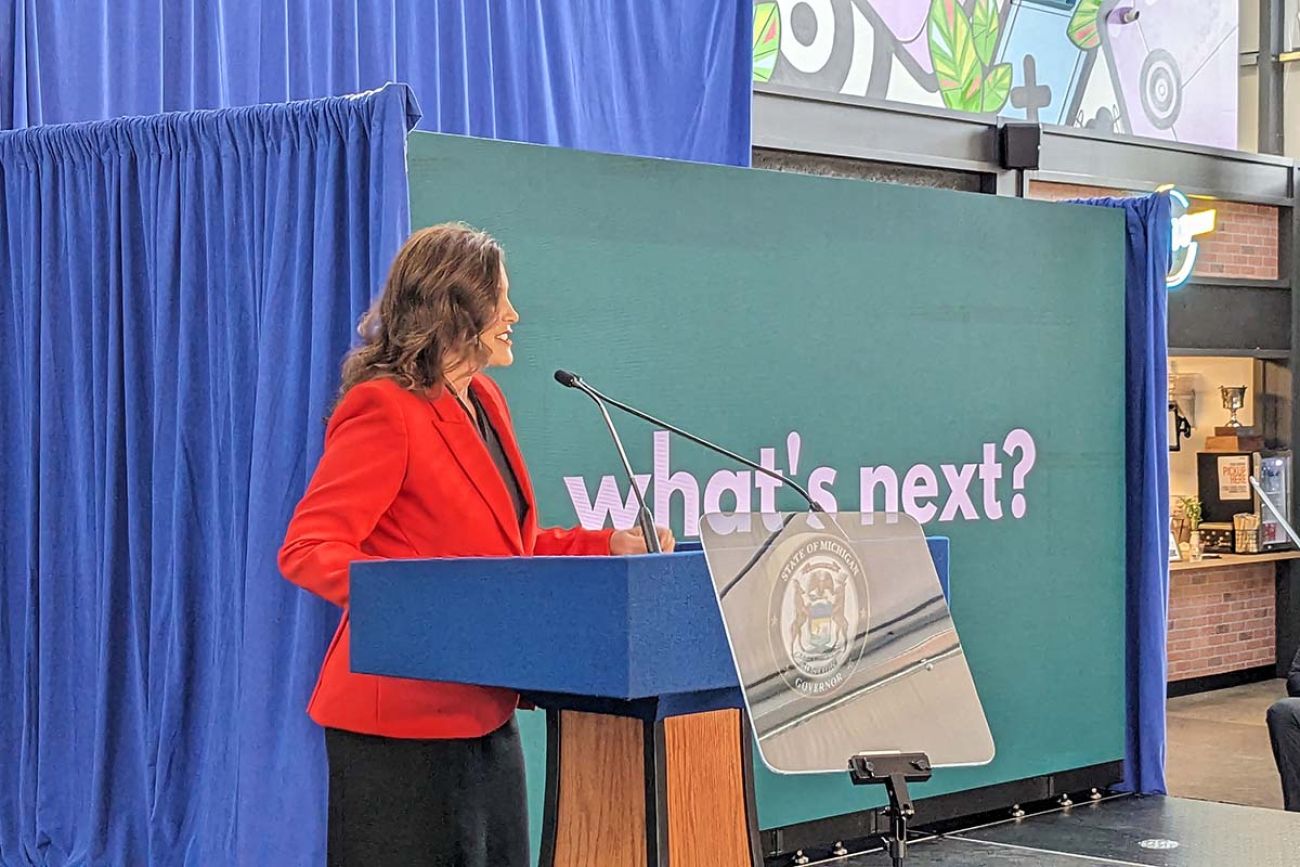Michigan Dems’ report card: Mixed bag passing Whitmer agenda as year ends

- Michigan Legislature adjourns after completing some — but not all — priorities of Democratic Gov. Gretchen Whitmer
- Unfinished business includes Whitmer-backed plans for a paid sick leave mandate and a Prescription Drug Affordability Board
- Republicans critics early adjournment as paid ‘Christmas vacation;’ Democrats vow continued work
LANSING —Michigan’s Democratic-led Legislature ended voting for the year on Thursday with a flurry of activity, but failed to fulfill some of Gov. Gretchen Whitmer’s top priorities, including requiring paid sick leave at most businesses and cutting prescription drug prices.
Officials will continue “discussions” on those issues into next year, House Speaker Joe Tate told reporters, defending the decision to adjourn early after two of his colleagues won mayoral races, causing Democrats to temporarily lose their two-seat majority in the House.
“I will put up the work that we've done this year with any legislative session in Michigan's history,” Tate said, noting lawmakers “went on a tear” earlier in the year by sending Whitmer bills that attempt to curb gun violence, expand civil rights protections and more.
Related:
- Michigan lawmakers propose new transparency push — then call it a year
- Michigan lawmakers OK financial disclosure rules; critics say they fall short
- Michigan Legislature’s Dem majority to adjourn for year over GOP objections
The Legislature typically doesn’t adjourn until mid or late-December, and Republicans call the early break a paid "Christmas vacation" that was prompted by Democrat’s desire to move up their presidential primary to late February, which required adjournment by mid-November.
“I guess the silver lining in this historically early adjournment is that they can’t impose any more harmful policies on struggling Michigan families — a small, but needed, respite," Senate Minority Leader Aric Nesbitt, R-Porter Township, said Thursday.
Whtimer and fellow Democrats, however, contend the early adjournment also mean other laws they previously adopted will take effect sooner, including targeted tax relief bills, gun control regulations and anti-discrimination protections for gay and transgender residents. Republicans had declined to give those bills “immediate effect,” so they don’t become law until 90 days after adjournment.
The decision to end the legislative year with nearly two months left on the calendar allows “Michiganders to reap the benefits of a historically productive legislative session ahead of schedule,” said Whitmer spokesperson Stacey LaRouche. “The governor looks forward to continuing this momentum in the next legislative session to deliver on these kitchen table issues for Michiganders."
Whtimer made her fall priorities for the Legislature clear with a “What’s Next Address” on Aug. 30 in Lansing. The Legislature can reconvene in January, but Democrats can’t pass legislation without bipartisan support until two vacated House seats are filled by special election – which likely won’t happen until late February at the earliest.
Here’s a look at what lawmakers did – and did not – check off from Whitmer’s list.
Reproductive Health Act: Passed, but …
Whitmer had called on the legislature to repeal what she called “politically motivated, medically unnecessary restrictions” on abortion and improve access by adopting a proposed Reproductive Health Act.
Lawmakers sent a final version of the legislation to the governor’s desk this week that repealed various abortion clinic regulations and a 2015 law that required women to purchase a separate insurance “rider” if they wanted their policy to cover abortion.
But the final plan was missing some key components and ended up as a “watered-down” version of the original proposal, according to abortion rights advocates.
Because of the slim liberal majority in the House and opposition from Democratic state Rep. Karen Whitsett of Detroit, leadership was forced to abandon Whitmer-backed plans to eliminate a 24-hour waiting period and allow government-run Medicaid insurance to pay for abortions.
Add ‘Obamacare’ protections to Michigan law: Passed
Whitmer last month signed legislation to write portions of the federal Affordable Care Act – commonly known as “Obamacare – into Michigan law. It’s a move the governor called for in the face of ongoing litigation that seeks to invalidate the federal health law.
The new law — similar to those passed in 15 other states — continues prohibitions on out-of-pocket expenses for preventative care and keeps coverage for "essential services" like ambulance rides and birth control. It bans annual or lifetime coverage caps, and also lets young people stay on their parents' policies until 26 years old.
Prescription Drug Affordability Board: Stalled
The Michigan Senate in October approved a Whitmer-backed plan to create a new Prescription Drug Affordability Board to review costs and potentially cap prices on medications whose costs create challenges for patients or health care providers.
But the plan, described by Whitmer as an attempt to rein in prescription drug prices, stalled in the House, where it has not even received a committee hearing amid closed-door debate over potential amendments and modifications.
“We're still having conversations,” Tate, the Democratic House Speaker, said Thursday, indicating the Legislature may “get back to that” next year.
100 percent clean energy standard: Passed
The Democratic-led Legislature this week gave final approval to bills that will require utilities to deliver 100 percent clean energy by 2040. Companion bills also heading to Whitmer for signature will let state regulators override local decisions about where to allow large-scale wind and solar arrays.
Democrats hailed the legislation as a game-changer in the fight against climate change, but Republicans argued the new policies will raise energy rates for consumers and blasted the majority for trampling on the right of local communities to block developments they don’t want.
Paid family and medical leave: Stalled
The governor used her “What’s Next Address” to urge legislation that would require Michigan businesses to provide paid family and medical leave to their employees, calling it a pro-family policy that would grow the state economy.
But Whitmer did not propose how the system would work, and early discussions fizzled as Republicans blasted an initial proposal that would have effectively created a “payroll tax” taken out of employee checks to cover the costs.
Senate Majority Leader Winnie Brinks, D-Grand Rapids, said Thursday she hopes to convene a workgroup with officials and stakeholders “to try to come together about what exactly we want to cover and how we pay for it.”
“Those things are really important questions that need to be answered,” Brinks said.
Streamlining permitting: Stalled
Whitmer called on the Legislature to streamline the state’s permitting process for advanced manufacturing, infrastructure and housing in order to “build more, faster and harness the full power of our economic development toolkit.”
However, with the Legislature adjourning for the year, there have not been any major action on that front. Legislation approved this month by the Senate — but not the House — would eliminate an environmental permit review commission created under former Gov. Rick Snyder.
Democracy protections: Tough to grade
Whitmer made a broad call to “ensure Michiganders are heard and respected” in the election process but offered few specific suggestions for the Legislature, so it is hard to determine whether they achieved that goal.
The Democratic-led Legislature finalized two significant bill packages this week that would create enhanced criminal penalties for intimidating election workers and begin to regulate the use of artificial intelligence in political advertisements by requiring disclosures.
The House — but not the Senate — approved legislation that would make it illegal to possess a gun within 100 feet of a voting location, a measure Democratic Secretary of State Jocelyn Benson had called for after courts overturned her unilateral attempt to do the same.
See what new members are saying about why they donated to Bridge Michigan:
- “In order for this information to be accurate and unbiased it must be underwritten by its readers, not by special interests.” - Larry S.
- “Not many other media sources report on the topics Bridge does.” - Susan B.
- “Your journalism is outstanding and rare these days.” - Mark S.
If you want to ensure the future of nonpartisan, nonprofit Michigan journalism, please become a member today. You, too, will be asked why you donated and maybe we'll feature your quote next time!




